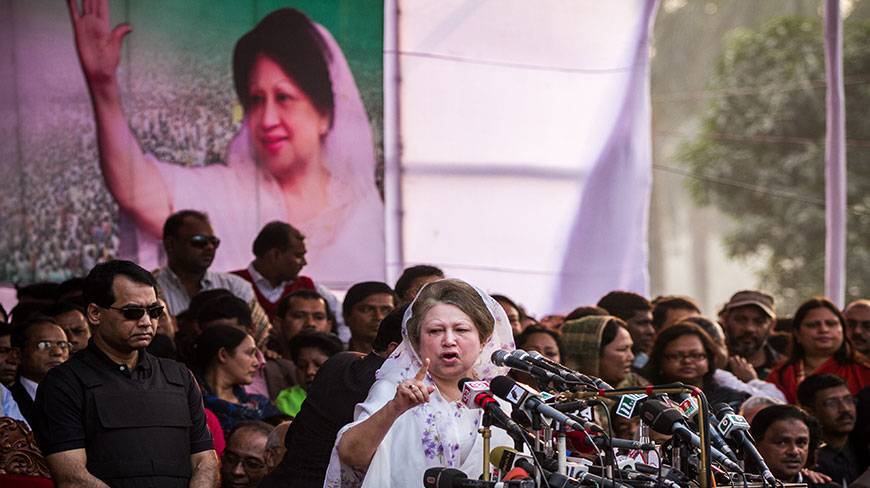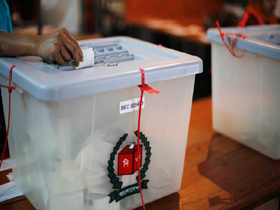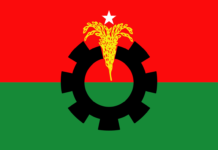Normally I would not comment publicly on Bangladeshi politics for the simple reason that I am an outsider. As it happens though, having spent seven years here – off and on – since 2006, I have grown particularly fond of Bangladesh and its people, and the quirks of both.
The impasse that led to the last Emergency in 2006 was quite an education for me in the politics of this country. To watch a comparable impasse play out again, though with so far a different outcome, has been fascinating to watch. I am confounded, however, by the reaction of large segments of the public and the punditry.
It is entirely understandable that BNP supporters are full of venomous condemnation of the elections that just transpired, and that AL supporters are full of self-satisfied mirth, even if some of them have the grace or smarts not to gloat openly.
What is perplexing is that a swathe of people who are not hard-core supporters of either party, the so-called swing voters along with a set of non-partisan commentators, seem to be enjoying blaming the government for somehow staging and pulling off what they regard as a sham election.
The Awami League has, in cricketing terms, played a straight bat. Everything the BNP has bowled up has been blocked or flicked to the boundary with ease. The BNP had only one kind of bowling – concede to our demands for a caretaker government, or we will bring the country to its knees.
The AL imperiously refused to concede this demand, out-politicked the BNP at every turn, and, despite enormous violence by BNP’s leading ally, eventually held the election, leaving the BNP bereft. The BNP had no strategy beyond a stubborn demand, no Plan B, and as a consequence finds itself excluded from parliament.
So why now is AL cast as the villain of the piece? It seems there is a concerted campaign to paint the election as a farce. However, if it was a farce, it was because the BNP refused to present candidates – not because the AL had the temerity to ignore the strident BNP demands.
Even stranger is the eagerness of notable sections of Bangladeshi intellectuals and the international press to argue that a new election is required so that the BNP can recuperate its position. Yet I cannot think of any instance in developed democracies where the disastrous and self-defeating policies of any party is rewarded with fresh polls, let alone an outpouring of sympathy from local intelligentsia or foreign diplomacy.
I don’t wish to sound like an AL apologist, heaven forbid! There have been scandals aplenty during its tenure (though even that kind of corruption is not unique to them). There is also a tendency towards authoritarianism, which also makes the main opposition’s self-implosion a concern.
But how is it AL’s fault that BNP has been such a miserable failure? Why should AL give BNP voters a second chance? Why don’t BNP voters force their party to adopt better policies or start finding a new horse to back?
BNP had stuck to the demands of the caretaker government, which was a total aberration for a place that, in all other aspects, tries to follow the Westminster system. BNP supporters have made much of the fact that allegedly the polls were heavily rigged.
In truth, all independent observers have placed turnout estimates far closer to that of the Election Commission than to the claims of BNP. There may be a case to be made for irregularities or even the EC being too compliant to the party in power. There are definitely grounds for devising a better election-time administration that both will accept.
But given that BNP’s only contribution to the pre-electoral process was to boycott the election and encourage violence among its allies, they are hardly blameless for the situation.
The most disturbing aspect of the election from my point of view was the escalation and stridency of the rhetoric of the BNP, which in many respects advocated violence as the only solution to the impasse.
This nexus between violence and rhetoric is one of the major points of difference between the two parties. I’m not saying that the AL does not use violence, but I can find no evidence of AL spokespeople talking of “civil war.”
The AL too has used hard programs when it was in opposition. But there is such a world of difference between people killed during political clashes in designated places versus commuters burned in their buses.
What I find appalling and what has compelled me to write this piece, is the degree to which BNP seems to be given a free pass by so many – intellectuals and citizens – for the enormous and unique sort of violence it has wreaked on the people in the name of political programs.
The fact that over 500 people have been killed over the election, mostly it seems at the hand of Jamaat-Shibir, should not be glossed over. To emphasise a rush to fresh polls is in fact to minimise the violence that marred much of last year.
I have read in the American press that the BNP-Jamaat coalition is a tactical alliance. Why is a tactical alliance okay but an ideological one not? As I write this piece, the hartals and blockades have been cancelled and the streets of Dhaka have returned to their normal state of chaos.
It is as if nothing has happened. The resilience of the people has reasserted itself and life returns to something approaching normality. Will it last? Will fresh polls alone solve everything? Will Hindus be safe in a Bangladesh ruled by a BNP more deeply obligated to ever more aggressive Islamists?
The emerging evidence seems to suggest that the folly of their stance has penetrated BNP thinking. Khaleda Zia is still demanding a fresh election but with a much softer agenda, but the fact that India and China and others have endorsed Sheikh Hasina as the new prime minister makes the possibility of a fresh election remote.
Bangladesh needs a durable solution to democratic transitions for sure. But it also needs a political future in which no mainstream parties are attached to terrorism.
To conclude on an optimistic note, it is possible that the electoral suicide of the BNP has created the opportunity for a new political paradigm to emerge in Bangladesh, one not based on dynastic politics or corruption. One certainly hopes so.
Source: Dhaka Tribune











The writer has assumed that the 2 parties are the only game in town and therefore; one party or the other is only option for the Bangladeshis. He likened it to a cricket match and left out logic in support of the Awami League stand. Bolstering recognition of the new AL government by India, Russia and China is all he thinks is necessary to legitimize this process. He does not make any notion of the rational aspect of the whole maneuver. He has accepted the position taken by the AL during this sham election and blamed BNP for the debacle. Perhaps some sense will arise in his thought process in that the election participated by less than 20 percent voters is not a democracy; just like BAKSAL method was not a democracy. A concocted writing like this is what we need to bury the future of Bangladesh.
The author claims that he is not an ‘apologist’ for Awami League. This is true because one would not need a rocket science to find out from his article that he is much more than that – he is the very embodiment of Awami League, to its last bone that is!
His analogy of BNP/AL election feud to the game of cricket is also grossly misleading. The author ought to have known that the pre-election movement/debate on poll time government was not something that was confined between BNP/AL.
All opinion polls prior to the January 5 sham election showed that 90% of the people of Bangladesh wanted change in the electoral arrangement – they wanted a poll-time neutral care-taker government – and thus the clash in reality, was a Bangladesh Vs. AL clash and not as the author would like us to believe, a clash between BNP/AL.
Author’s concluding remark,”To conclude on an optimistic note, it is possible that the electoral suicide of the BNP has created the opportunity for a new political paradigm to emerge in Bangladesh, one not based on dynastic politics or corruption. One certainly hopes so”, also sounds both hollow and hypocritical at the same time.
Hollow because there is no credible evidence to suggest that by not participating in the election BNP has committed a “electoral suicide” and thus is dead. If the author wants to find the true picture he should tell his AL handlers to stop harassing BNP, release its jailed leaders and give it legitimate political space to hold peaceful rallies, meetings etc and then see whether as a party, BNP is dead or not.
Also author’s remark that BNP’s non-participation in the election and thus its exclusion from the current parliamentary process (from all other accounts, a sham), has created a “new political paradigm” that has also opened the opportunity to do away with dynastic politics is one-sided and nothing but AL’s much desired minus BNP policy that to say the least is utterly hypocritical if not dishonest.
This article is one of many such articles that have hit the media lately that does little to advance cause democracy in Bangladesh. Evolution of a true democratic culture requires more objective and non-partisan discussions and explore options that promote inclusiveness, participation, transparency and accountability in governance. Indeed, if such an option advocates abolition of cult and dynastic politics, be it. But this must include all sides that nurture such predatory practices.
Finally, we all must realize that Bangladesh is passing through one of its most difficult times. Democracy is in shambles, people are divided and our very existence as an independent state is at risk. In this difficult time, there is one thing we must all avoid doing – we must not misinform and confuse people with bogus theories and one-sided ideas and thus make our journey to the establishment of a true democratic polity and the notion of a sense of one nationhood with religious and other diversities in the country more slippery. Enough is enough!
To be honest, I think the comment of ADK is a much better piece of insightful writing than the article itself. The arguments of the author are very weak and nakedly biased. If he is honest about his opinions, I must say that he severely lacks knowledge in dynamics of Bangladesh politics. However, it is more than likely that the author wrote this piece with an evil motive which may be why he had to start quite naively, “Normally I would not comment publicly on Bangladeshi politics for the simple reason that I am an outsider.”